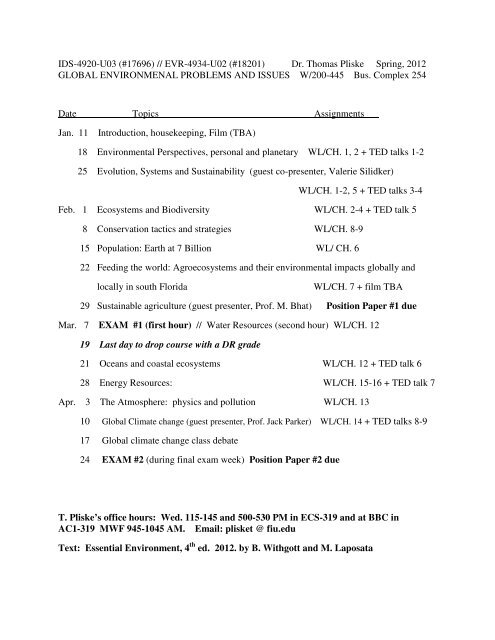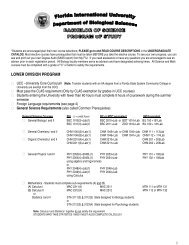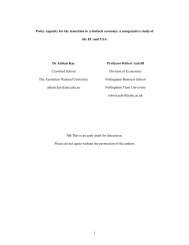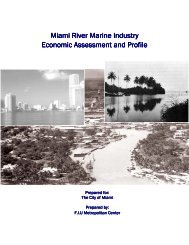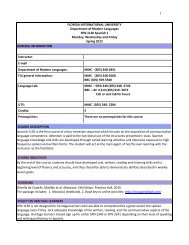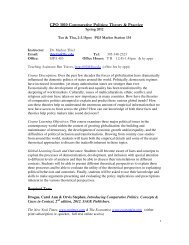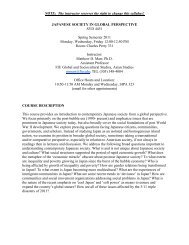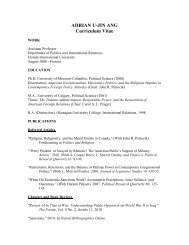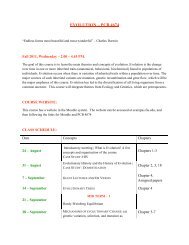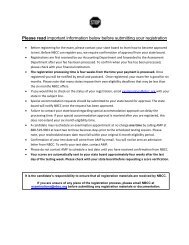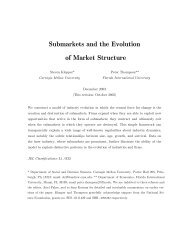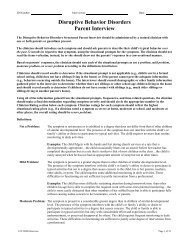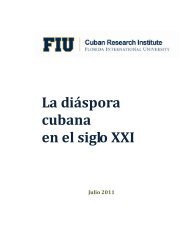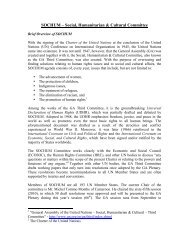IDS-4920-U03 (#17696) // EVR-4934-U02 (#18201) Dr. Thomas ...
IDS-4920-U03 (#17696) // EVR-4934-U02 (#18201) Dr. Thomas ...
IDS-4920-U03 (#17696) // EVR-4934-U02 (#18201) Dr. Thomas ...
Create successful ePaper yourself
Turn your PDF publications into a flip-book with our unique Google optimized e-Paper software.
<strong>IDS</strong>-<strong>4920</strong>-<strong>U03</strong> (<strong>#17696</strong>) // <strong>EVR</strong>-<strong>4934</strong>-<strong>U02</strong> (<strong>#18201</strong>) <strong>Dr</strong>. <strong>Thomas</strong> Pliske Spring, 2012<br />
GLOBAL ENVIRONMENAL PROBLEMS AND ISSUES W/200-445 Bus. Complex 254<br />
Date Topics Assignments___<br />
Jan. 11 Introduction, housekeeping, Film (TBA)<br />
18 Environmental Perspectives, personal and planetary WL/CH. 1, 2 + TED talks 1-2<br />
25 Evolution, Systems and Sustainability (guest co-presenter, Valerie Silidker)<br />
WL/CH. 1-2, 5 + TED talks 3-4<br />
Feb. 1 Ecosystems and Biodiversity WL/CH. 2-4 + TED talk 5<br />
8 Conservation tactics and strategies WL/CH. 8-9<br />
15 Population: Earth at 7 Billion WL/ CH. 6<br />
22 Feeding the world: Agroecosystems and their environmental impacts globally and<br />
locally in south Florida WL/CH. 7 + film TBA<br />
29 Sustainable agriculture (guest presenter, Prof. M. Bhat) Position Paper #1 due<br />
Mar. 7 EXAM #1 (first hour) // Water Resources (second hour) WL/CH. 12<br />
19 Last day to drop course with a DR grade<br />
21 Oceans and coastal ecosystems WL/CH. 12 + TED talk 6<br />
28 Energy Resources: WL/CH. 15-16 + TED talk 7<br />
Apr. 3 The Atmosphere: physics and pollution WL/CH. 13<br />
10 Global Climate change (guest presenter, Prof. Jack Parker) WL/CH. 14 + TED talks 8-9<br />
17 Global climate change class debate<br />
24 EXAM #2 (during final exam week) Position Paper #2 due<br />
T. Pliske’s office hours: Wed. 115-145 and 500-530 PM in ECS-319 and at BBC in<br />
AC1-319 MWF 945-1045 AM. Email: plisket @ fiu.edu<br />
Text: Essential Environment, 4 th ed. 2012. by B. Withgott and M. Laposata
COURSE POLICY: GLOBAL ENVIRONMENTAL ISSUES<br />
1. Course Perspective: By the time you finish this course, you should have a good<br />
understanding of many of the environmental problems that we face both locally here in<br />
south Florida and also in the global community. That understanding will necessarily be<br />
multi-dimensional. Hopefully, your knowledge will be founded in how you come to<br />
understand yourself as a member of the planetary community and how you feel about that<br />
membership; for like it or not, willing or unwilling, you are already a member.<br />
Although this is not an environmental science course, science is a major player in<br />
shaping how we understand our environment and, as Al Gore and others have reminded<br />
us, often reveals inconvenient truths, especially if you favor a strictly utilitarian interest<br />
in the earth’s bounty. As a result, we need to have a clear understanding of science’s<br />
ethics, goals and methods, since a great deal of information is available to us where<br />
scientific process has been deliberately or ignorantly compromised in one way or another.<br />
In significant addition to the worldview that science gives us there are others that are<br />
of equal or even greater weight. In our exploration of the global environment we will<br />
need to consider our spirituality, our inner or religious experience in relation to earth.<br />
If you are a member of any indigenous culture or adhere to the philosophy of the Deep<br />
Ecologists, this would be your primary consideration about the environment. Also, we<br />
obviously have to include cultural economic, political and social drivers of our<br />
environmental policies.<br />
2. Evaluation: Your grade is determined by three factors: exams, papers and<br />
attendance/participation in discussion.<br />
Exams (2) 40%<br />
Papers (2) 30%<br />
Attendance/participation 30%<br />
The exams cover the course content from both reading and class presentations and will be in<br />
essay and short-answer or multiple-choice format depending on class size. The papers are based<br />
on the subjective aspects of the course, how you feel personally about environmental issues and<br />
how you and humanity in general should approach them. All of us will be learning from one<br />
another over the next fifteen weeks, so attendance and participation in our group meetings is an<br />
important part of that process.<br />
Our grading scale is as follows<br />
A: 92-100% A-: 85-91% B+: 80-84% B: 76-79% B-: 73-75% C+: 70-72%<br />
C: 60-69% D+: 57-59% D: 53-56% D-: 50-52% F: less than 50%.
3. Papers: You will be writing two “position papers” during the course. The papers have<br />
a minimum length of 1500 words and must be double-spaced. The position is your<br />
own position on a particular issue, one at which you arrive after going deep within to<br />
plumb your own conscience and then also after doing whatever research you need to do<br />
to discuss the issue from the many perspectives that it involves. You will certainly have<br />
to go to other sources besides beyond your textbook to get a balanced view, both pro and<br />
con, of the issues you choose. Please check the syllabus for the due dates of these papers.<br />
All papers will be submitted to Turnitin, which is a service for student papers which<br />
detects plagiarized material. Plagiarism is the use of unoriginal statements which you pass<br />
off as your own without giving due credit by the use or quotation marks or a bibliography. It<br />
is a most serious form of academic misconduct and also, more seriously, an insult to your<br />
own creativity and intelligence.<br />
You will need to go to www. turnitin. com to set up your account. There is no charge<br />
to you, since FIU has a contract with Turnitin. Our course name is Global Environmental<br />
Issues and Problems, the course number is 4651408 and the password is GaiaOne<br />
which is case-sensitive. Paper #1 can be turned in anytime until midnight on Feb. 29.<br />
Paper #2 can be turned in any time up until midnight on Apr. 24. Failure to turn in the<br />
papers by the deadline will result in a zero for the assignment. No papers are<br />
acceptable unless submitted to Turnitin. When you submit, you will see that there is a<br />
“similarity index” which is the amount of unoriginal material detected. The maximum<br />
limit for your papers is 7%.<br />
Your papers will be graded on how well you define and support your position and also on<br />
how well you write to express yourself, even if you play a devil’s advocate or support an<br />
unpopular or controversial position. If you have trouble writing without spelling,<br />
grammatical and sentence structure errors, you may want to take the help of the Writing<br />
Center on the first floor of the Library across from Starbuck’s.<br />
Suggestions for formatting and writing papers are provided included in a separate section.<br />
POSITION PAPER TOPICS<br />
1. The Endangered Species Act gives wildlife “rights” that are not merited. 2. The<br />
value of preserving biodiversity is secondary to promoting economic growth and<br />
development. 3. GMOs (Genetically Modified Organisms) in our food supply are<br />
perfectly safe. 4. The treatment of animals in the food industry is unconscionable<br />
5. Environmental costs and damage should be viewed as “external” in a progressive<br />
economy. 6. Do we overuse chemical fertilizers in agriculture? 7. Should we<br />
try to control human population growth? 8. Why and how should the USA<br />
decrease its carbon footprint? 9. The science on global climate change is<br />
inconclusive. 10. Environmental regulations imposed on US industry slow the<br />
creation of new jobs. 11. Pesticides that enter the atmosphere, soils and water are<br />
usually diluted below threshold levels and cannot harm us or wildlife. 12. The<br />
environment and its wildlife and resources are there for the purpose of human utility.<br />
13. Procuring energy resources for the US is a matter of national security. 14.<br />
Environmental education should be required in all primary and secondary schools.
Pick any two for your paper topics. If none of these suit you, I’m open to<br />
alternatives.<br />
4. Attendance. Since we are a colloquium, a group whose members discuss ideas and<br />
issues, I expect you to attend regularly and to share your concerns. Since we are a twoperiod<br />
class, you will be asked to sign in at the beginning of each hour. The sign-in<br />
sheets will be at the front of the classroom. It is your responsibility to sign in. You may<br />
not sign in other students, and if you sign in and leave, you will not receive credit for<br />
attendance.<br />
Also, things evolve and unfold as the class goes forward, and changes to assignments<br />
or topics will be announced in class. If you’re not there, you may be wholly or partly<br />
clueless about what’s happening.<br />
5. TED talks and other on-line media. There are several on-line viewing assignments,<br />
which should be done before attending class. Most of these are short (c. 20 min.), eyeopening<br />
gulps of cutting-edge ideas and discoveries and aimed at a non-technical<br />
audience. You can access them at www. ted. com/talks. Then search for the item<br />
under the speaker’s name.<br />
TED talk 1: John Rockstrom: Let the environment guide our development.<br />
TED talk 2: Michael Specter: The danger of science denial<br />
TED talk 3: William McDonough on cradle to cradle design<br />
TED talk 4: Pavan Sukhdev: Put a value on Nature.<br />
TED talk 5: E.O. Wilson on saving life on earth<br />
TED talk 6: Capt. Charles Moore on seas of plastic<br />
TED talk 7: Amory Lovins on willing the oil end game<br />
TED talk 8: Al Gore warns on latest climate change<br />
TED talk 9: James Baleg: Time-lapse proof of extreme ice loss<br />
6. Communications. The easiest way for me to get in touch with you is through your<br />
FIU email. Please check your FIU messages regularly for any changes in schedule,<br />
assignments, etc.<br />
7. Global Climate Change Debate. The last meeting on April 17 will be devoted to a<br />
debate on global climate change, in which everyone will participate. We will discuss the<br />
organization and structure of the debate in the first few class meetings<br />
8. Blows and buffets of life. If you suffer ill fortune in the form of illness, family crises,<br />
economic downturn events or other things that make it difficult to give attention to<br />
school, attend class or complete assignments, PLEASE GET IN TOUCH WITH ME.<br />
I’ve seen a lot in 35 years at FIU and know how to help out if you need help. You<br />
automatically have my sympathy, but if you suffer in silence, what can I do?


